牛津译林版英语八年级上Unit 5 Wild animals语言要点和语法拓展课件(39张PPT)
文档属性
| 名称 | 牛津译林版英语八年级上Unit 5 Wild animals语言要点和语法拓展课件(39张PPT) |
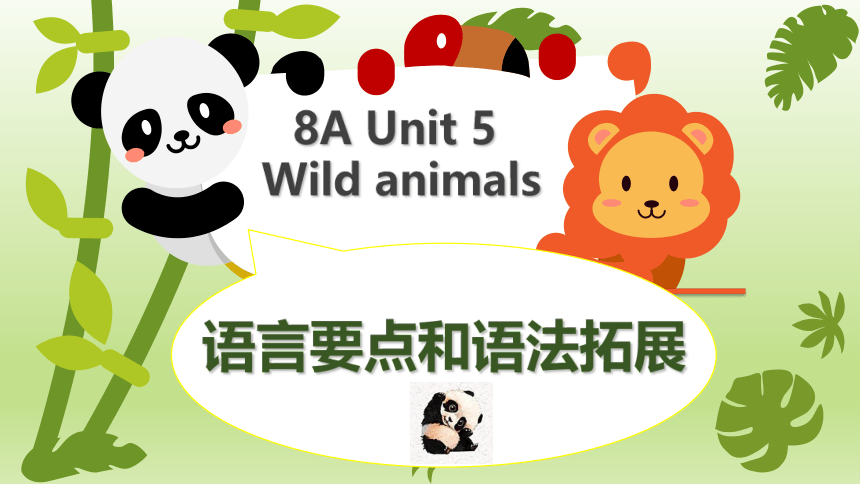
|
|
| 格式 | zip | ||
| 文件大小 | 5.3MB | ||
| 资源类型 | 教案 | ||
| 版本资源 | 牛津译林版 | ||
| 科目 | 英语 | ||
| 更新时间 | 2020-05-14 00:00:00 | ||
图片预览

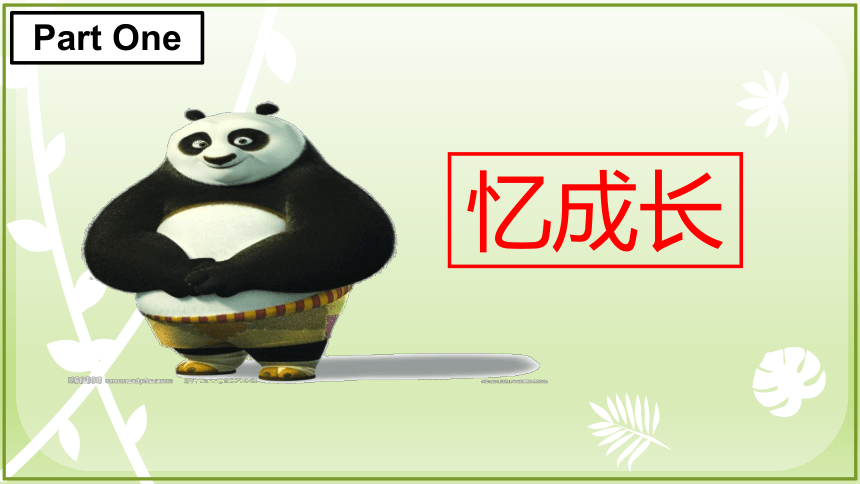
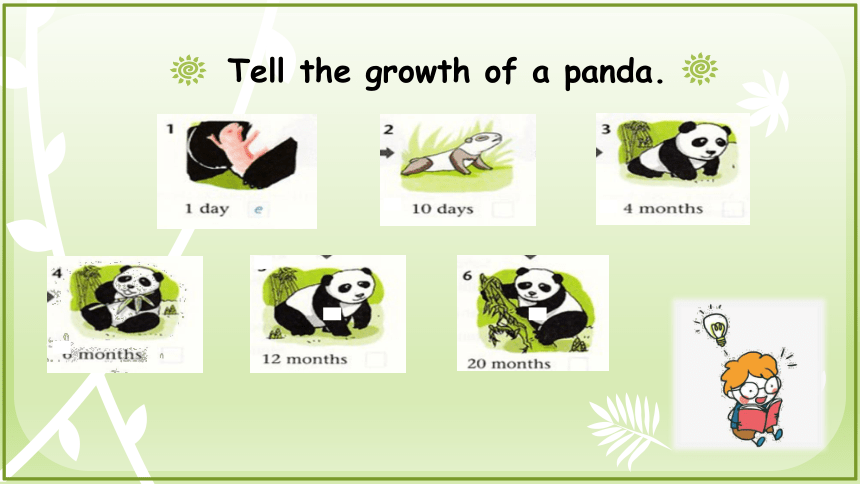
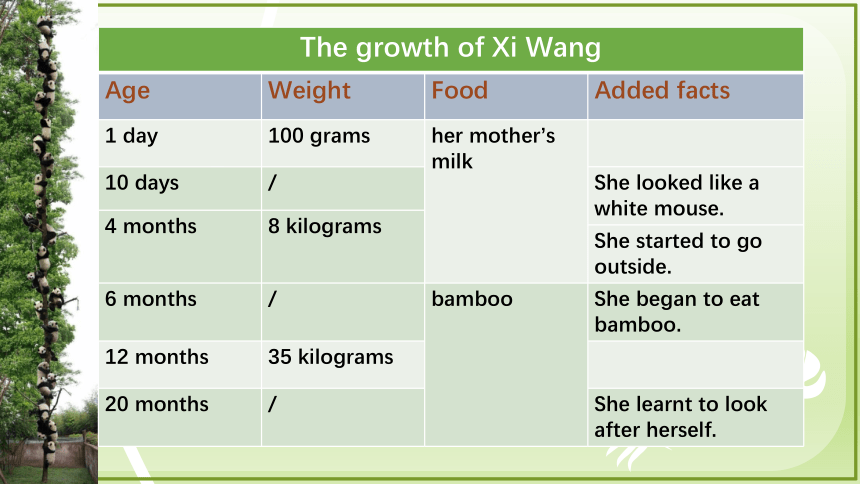

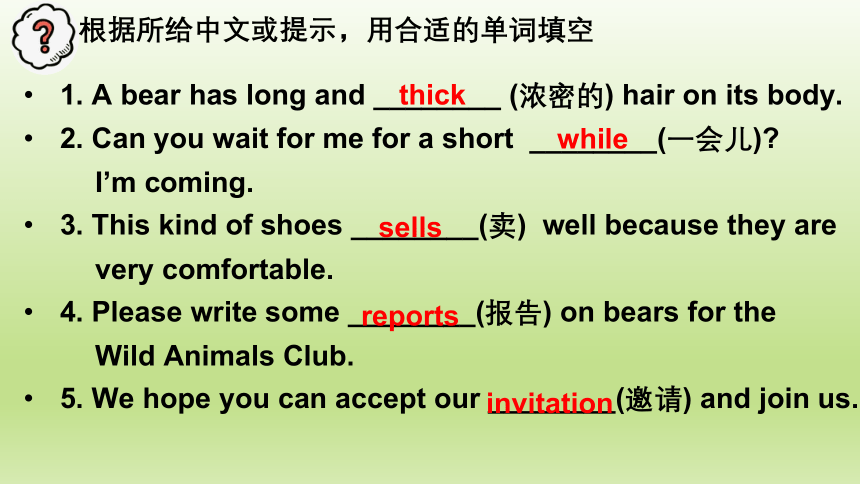

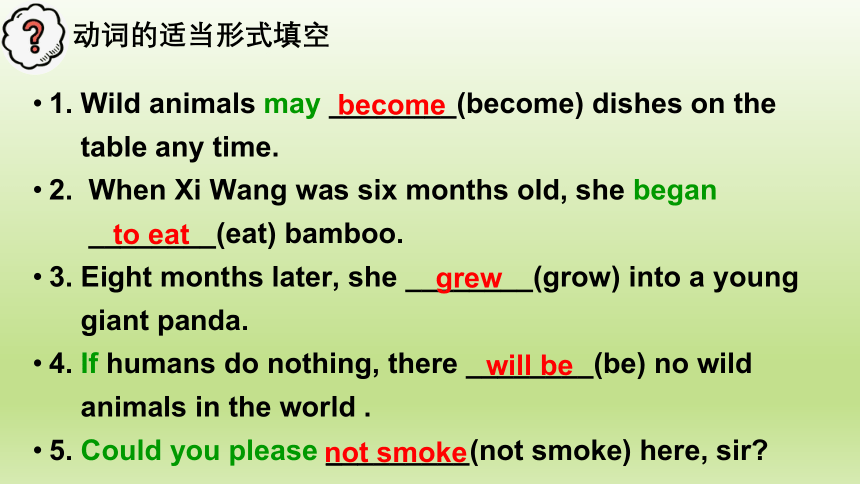
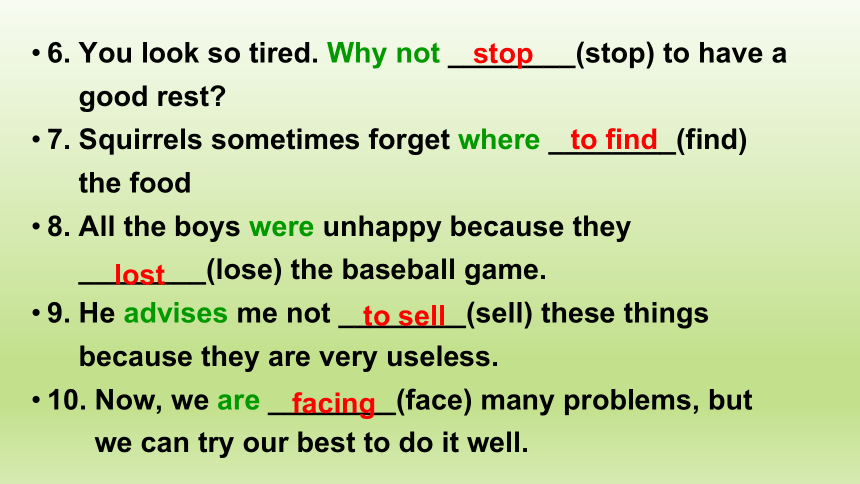
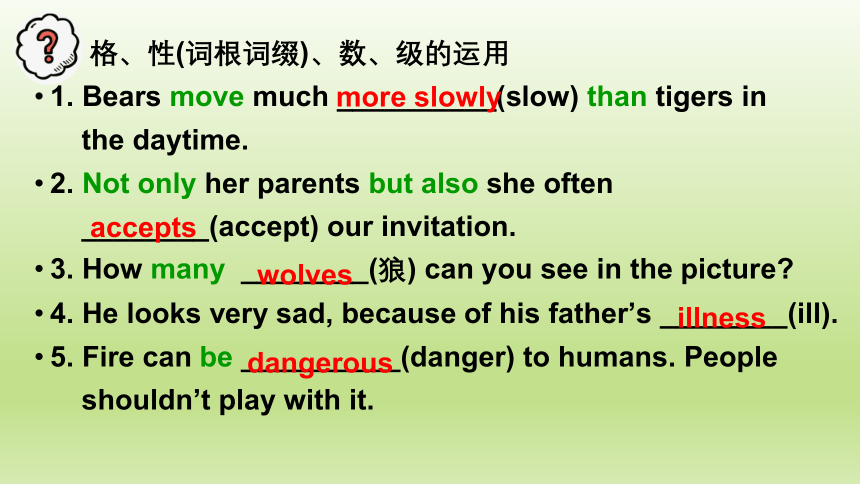
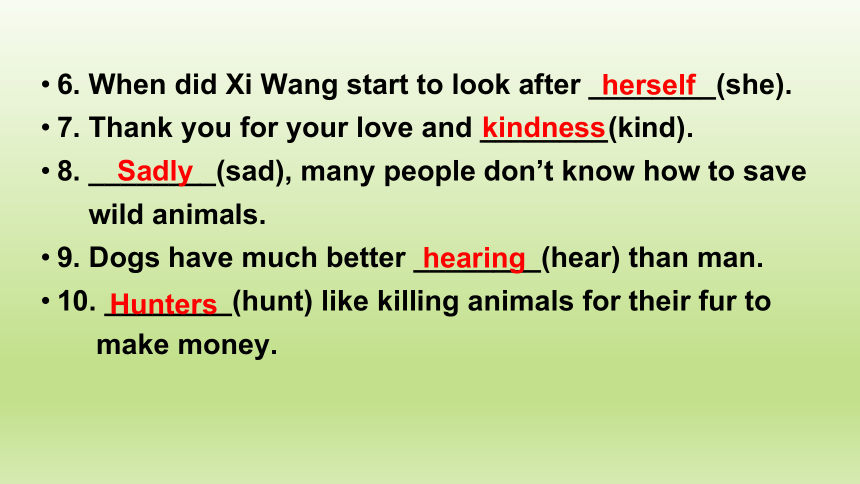
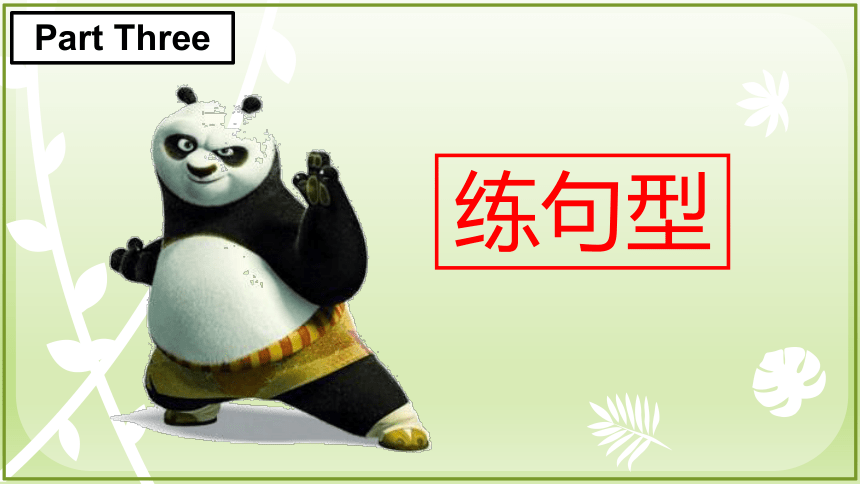
文档简介
(共39张PPT)
8A Unit 5
Wild animals
语言要点和语法拓展
忆成长
Part One
Tell the growth of a panda.
The growth of Xi Wang
Age Weight Food Added facts
1 day 100 grams her mother’s milk
10 days / She looked like a white mouse.
4 months 8 kilograms
She started to go outside.
6 months / bamboo She began to eat bamboo.
12 months 35 kilograms
20 months / She learnt to look after herself.
记词汇
Part Two
根据所给中文或提示,用合适的单词填空
1. A bear has long and ________ (浓密的) hair on its body.
2. Can you wait for me for a short ________(一会儿)?
I’m coming.
3. This kind of shoes ________(卖) well because they are
very comfortable.
4. Please write some ________(报告) on bears for the
Wild Animals Club.
5. We hope you can accept our ________(邀请) and join us.
thick
while
sells
reports
invitation
6. --How many giant pandas are there in Hongshan Zoo?
--There is n_______ left.
7. He is the only one in his family, his parents d________
last year.
8. We should take more a________ to protect our
environment(环境).
9. At the b________ of the letter, he tells me about his life.
10. Don’t keep the window c_______ . It’s too hot today.
none
died
action
beginning
closed
动词的适当形式填空
1. Wild animals may ________(become) dishes on the
table any time.
2. When Xi Wang was six months old, she began
________(eat) bamboo.
3. Eight months later, she ________(grow) into a young
giant panda.
4. If humans do nothing, there ________(be) no wild
animals in the world .
5. Could you please _________(not smoke) here, sir?
become
to eat
grew
will be
not smoke
6. You look so tired. Why not ________(stop) to have a
good rest?
7. Squirrels sometimes forget where ________(find)
the food
8. All the boys were unhappy because they
________(lose) the baseball game.
9. He advises me not ________(sell) these things
because they are very useless.
10. Now, we are ________(face) many problems, but
we can try our best to do it well.
stop
to find
lost
to sell
facing
格、性(词根词缀)、数、级的运用
1. Bears move much __________(slow) than tigers in
the daytime.
2. Not only her parents but also she often
________(accept) our invitation.
3. How many ________(狼) can you see in the picture?
4. He looks very sad, because of his father’s ________(ill).
5. Fire can be __________(danger) to humans. People
shouldn’t play with it.
more slowly
accepts
wolves
illness
dangerous
6. When did Xi Wang start to look after ________(she).
7. Thank you for your love and ________(kind).
8. ________(sad), many people don’t know how to save
wild animals.
9. Dogs have much better ________(hear) than man.
10. ________(hunt) like killing animals for their fur to
make money.
herself
Sadly
kindness
hearing
Hunters
练句型
Part Three
becoming smaller and smaller
As a result
have a place to live or food to eat
If we do nothing
none left
with its eyes closed
may be sleeping
smell things far away
work as a team
for a short while
1.然而,竹林正变得越来越小。因此,熊猫可能无处生存,无以为食。
However, the bamboo forests
are . , pandas
may not .?
2.如果我们什么都不做,可能很快就一只(熊猫)也不剩了!
, soon there may be !?
3.这匹马正闭眼站着,它可能在睡觉。
The horse is standing .
It .?
4.我们英语老师总是让我们以团队形式工作来互相帮助。
Our English teacher always asks us to to
help each other.?
5.老虎只能在短时间内跑很快,但是嗅不到远处的东西。
Tigers can run fast, but just . They can’t
.?
for me to work out
at birth
was born
as big as
remember to go
the same way as
Hundreds
lost their lives
because of hunting
through the whole winter
saving food
6.这道数学题我很难解出。
It’s difficult the maths problem.?
7.希望刚出生时, 看起来像一只白鼠一样大。
When Xi Wang , she looked a white mouse.
/ Xi Wang looked as big as a white mouse .?
8.蜜蜂总是记得顺着来时的路返回。
Bees always back they
came.?
9.每年成百上千头熊因为捕猎而丧生。
of bears every year
.
10.蛇整个冬天都在睡觉而不是储存食物。
Snakes sleep instead of
. ?
1. Some of people lost their way in the wild last week. (同义句)
Some of people ______ ______ in the wild last week.
2. How old were you when I first saw you? (同义句)
How old were you when I saw you ______ ______ ______
______?
3. We should no more buy fur coats. (同义句)
We __________ buy fur coats ______ ______.
4. What is the meaning of this sentence? (同义句)
What ______ this sentence ______?
5. He had a great time at the party last night. (强调句)
He ______ ______ a great time at the party last night.
got lost
shouldn’t any more
for the first
time
does mean
did have
析语法
Part Four
may (not) + be/do 表示“可能”时,相当于maybe
1. He may not be at home now.
=Maybe he isn’t at home now.
The baby may have something nice to eat.
=Maybe the baby has something nice to eat.
2. Can pandas live a happy life if …? √
May pandas live …? ×
表示推测时,may 通常不用于一般疑问句
can常用于否定句、一般疑问句
3. He can’t know the truth.
他不可能知道真相。
He may not know the truth.
他可能不知道照相。
意思不同
4. You?have?worked?hard?all?day.
You?______?be?tired.
must
can, may, must 表示猜测:
can不肯,may不问,
must肯定不否问。
must 表示“一定”
不定式有to do和do,
多数加to do少数加do,
下列动词后省去to ,
“三看”“两听”“一感觉”,
外加三个“小使役”,
保你永远不忘记!
see, watch, look at
hear, listen to
feel
let, make, have
动词不定式:verbs + (not) to do
1. They are preparing __________(have) a sports meeting.
2. Jim agreed __________(go) to the West Lake.
3. It’s easy __________(play) softball.
4. What made you __________(feel) sad?
5. Mr White learned __________(ride) a horse last year.
6. We will try our best __________(read) more books.
7. Let’s __________(share) our joys together.
8. I don’t know where __________(visit) next year?
9. Max wondered how __________(start) a campfire.
10. Are you ready __________(drive) me home?
11. Last week, we chose __________(visit) Tai Lake to enjoy ourselves.
to have
to go
to play
feel
to ride
to read
share
to visit
to start
to drive
to visit
Blank filling:
(情态动词)
What will we take during the trip?
We may take …
We may take a map to the zoo.
We may take a camera to take some photos.
1.Giving advice (提出建议):
If we are going on a trip to the zoo …
She couldn’t go outside at birth.
Now she can.
She couldn’t eat bamboo at 4 months old.
Now, she can.
She wasn’t ______ look after herself at 12 months old. Now, she can.
can/could=be able to
able to
2.Ability (能力):
______ I feed the animals in the zoo?
Yes, you ______.
No, you ______.
Could
can’t/I’m afraid not
can/could
can/may
在疑问句中,用could可表示请求,
语气较委婉。
3.Making requests (请求许可):
Visitor:
Zookeeper:
Visitor:
Zookeeper:
No, you can’t./No, you mustn’t.
Yes, you may.
May I take photos of pandas?
May I feed pandas?
Might
3.Making requests (请求许可):
4.Obligation (义务):
Zookeeper: You must protect the animals.
Visitors: Must we keep the zoo clean?
you must.
you don’t have to.
you needn’t.
常用于否定句或一般疑问句中
Visitors: Must we feed the animals?
Zookeeper:
No,
No,
Yes,
Zookeeper:
If we do nothing, soon there may be none left!
The bamboo forests are becoming smaller and smaller. As a result, pandas may not have a place to live or food to eat.
5.Possibility (可能性):
may 表示猜测可能性(用于肯定
或否定句中)
Which animal is the biggest in the zoo?
It must be ________.
It can’t be ________.
It mustn’t be ...
5.Possibility (可能性):
(动词不定式)
1、 Subject (主语)
2、 Object (宾语)
3、 Object complement (宾语补足语)
4、 Predictive (表语)
5、 Attributive (定语)
6、 Adverbial (状语)
Functions of Infinitive 动词不定式的作用
1、 Subject (主语)
To hear your voice is so nice.
To study hard is very important.
It is so nice to hear your voice.
It is very important to study hard.
不定式作主语时,通常用it作形式主语,
把真正的主语放在后面。
Tips
It takes sb. some time to do sth.
It takes me three hours to finish the homework every day.
我每天花三个小时完成家庭作业。
I spend three hours finishing the homework every day.
1、 Subject (主语)
It is + n. + (for sb) to do sth.
It is my pleasure to help you with your English.
帮助你学习英语是我的荣幸。
动词 + 宾语(sb./sth.) + to do sth.
The teacher asked her ______________________. (回答问题)
The doctor told me ______________________.
(好好休息)
3、 Object complement (宾语补足语)
对宾语进行补充说明
常用动词:ask, tell, want, invite, advise等
to answer the question
to have a good rest
Tips
主语 + be + to do sth
His work is to clean the classroom every day.
4、 Predictive (表语)
我的梦想是成为一名歌手。
job / duty / idea / plan / hope / wish
My dream is to be a singer.
他的工作是每天清扫教室。
I have a lot of work ________(do).
I want to find something ________(drink).
5、 Attributive (定语)
放在被修饰词的后面
不定式为不及物动词时后面应有必要的介词。
I’m looking for a hotel ________.
A. stay B. stay at C. to stay D. to stay at
D
Tips
to do
to drink
主语 + be + adj.(表情感) + to do sth.
(happy / glad / sorry / sad / angry / afraid)
I’m sorry to hear that.
6、 Adverbial (状语)
I’m glad to see you.
我很遗憾听到此事。
很高兴见到你。
adj./adv. + enough to do sth.
too + adj./adv. + to do sth.
You are too young to do this job.
You are not old enough to do this job.
He ran fast enough to catch the bus.
6、 Adverbial (状语)
你年纪太小了,做不了这项工作。
他跑得够快能赶上公交车。
The fireman ran into the room to save the girl. (划线提问)
____ ____ the fireman run into the room?
Why did
6、 Adverbial (状语)
目的状语
8A Unit 5
Wild animals
语言要点和语法拓展
忆成长
Part One
Tell the growth of a panda.
The growth of Xi Wang
Age Weight Food Added facts
1 day 100 grams her mother’s milk
10 days / She looked like a white mouse.
4 months 8 kilograms
She started to go outside.
6 months / bamboo She began to eat bamboo.
12 months 35 kilograms
20 months / She learnt to look after herself.
记词汇
Part Two
根据所给中文或提示,用合适的单词填空
1. A bear has long and ________ (浓密的) hair on its body.
2. Can you wait for me for a short ________(一会儿)?
I’m coming.
3. This kind of shoes ________(卖) well because they are
very comfortable.
4. Please write some ________(报告) on bears for the
Wild Animals Club.
5. We hope you can accept our ________(邀请) and join us.
thick
while
sells
reports
invitation
6. --How many giant pandas are there in Hongshan Zoo?
--There is n_______ left.
7. He is the only one in his family, his parents d________
last year.
8. We should take more a________ to protect our
environment(环境).
9. At the b________ of the letter, he tells me about his life.
10. Don’t keep the window c_______ . It’s too hot today.
none
died
action
beginning
closed
动词的适当形式填空
1. Wild animals may ________(become) dishes on the
table any time.
2. When Xi Wang was six months old, she began
________(eat) bamboo.
3. Eight months later, she ________(grow) into a young
giant panda.
4. If humans do nothing, there ________(be) no wild
animals in the world .
5. Could you please _________(not smoke) here, sir?
become
to eat
grew
will be
not smoke
6. You look so tired. Why not ________(stop) to have a
good rest?
7. Squirrels sometimes forget where ________(find)
the food
8. All the boys were unhappy because they
________(lose) the baseball game.
9. He advises me not ________(sell) these things
because they are very useless.
10. Now, we are ________(face) many problems, but
we can try our best to do it well.
stop
to find
lost
to sell
facing
格、性(词根词缀)、数、级的运用
1. Bears move much __________(slow) than tigers in
the daytime.
2. Not only her parents but also she often
________(accept) our invitation.
3. How many ________(狼) can you see in the picture?
4. He looks very sad, because of his father’s ________(ill).
5. Fire can be __________(danger) to humans. People
shouldn’t play with it.
more slowly
accepts
wolves
illness
dangerous
6. When did Xi Wang start to look after ________(she).
7. Thank you for your love and ________(kind).
8. ________(sad), many people don’t know how to save
wild animals.
9. Dogs have much better ________(hear) than man.
10. ________(hunt) like killing animals for their fur to
make money.
herself
Sadly
kindness
hearing
Hunters
练句型
Part Three
becoming smaller and smaller
As a result
have a place to live or food to eat
If we do nothing
none left
with its eyes closed
may be sleeping
smell things far away
work as a team
for a short while
1.然而,竹林正变得越来越小。因此,熊猫可能无处生存,无以为食。
However, the bamboo forests
are . , pandas
may not .?
2.如果我们什么都不做,可能很快就一只(熊猫)也不剩了!
, soon there may be !?
3.这匹马正闭眼站着,它可能在睡觉。
The horse is standing .
It .?
4.我们英语老师总是让我们以团队形式工作来互相帮助。
Our English teacher always asks us to to
help each other.?
5.老虎只能在短时间内跑很快,但是嗅不到远处的东西。
Tigers can run fast, but just . They can’t
.?
for me to work out
at birth
was born
as big as
remember to go
the same way as
Hundreds
lost their lives
because of hunting
through the whole winter
saving food
6.这道数学题我很难解出。
It’s difficult the maths problem.?
7.希望刚出生时, 看起来像一只白鼠一样大。
When Xi Wang , she looked a white mouse.
/ Xi Wang looked as big as a white mouse .?
8.蜜蜂总是记得顺着来时的路返回。
Bees always back they
came.?
9.每年成百上千头熊因为捕猎而丧生。
of bears every year
.
10.蛇整个冬天都在睡觉而不是储存食物。
Snakes sleep instead of
. ?
1. Some of people lost their way in the wild last week. (同义句)
Some of people ______ ______ in the wild last week.
2. How old were you when I first saw you? (同义句)
How old were you when I saw you ______ ______ ______
______?
3. We should no more buy fur coats. (同义句)
We __________ buy fur coats ______ ______.
4. What is the meaning of this sentence? (同义句)
What ______ this sentence ______?
5. He had a great time at the party last night. (强调句)
He ______ ______ a great time at the party last night.
got lost
shouldn’t any more
for the first
time
does mean
did have
析语法
Part Four
may (not) + be/do 表示“可能”时,相当于maybe
1. He may not be at home now.
=Maybe he isn’t at home now.
The baby may have something nice to eat.
=Maybe the baby has something nice to eat.
2. Can pandas live a happy life if …? √
May pandas live …? ×
表示推测时,may 通常不用于一般疑问句
can常用于否定句、一般疑问句
3. He can’t know the truth.
他不可能知道真相。
He may not know the truth.
他可能不知道照相。
意思不同
4. You?have?worked?hard?all?day.
You?______?be?tired.
must
can, may, must 表示猜测:
can不肯,may不问,
must肯定不否问。
must 表示“一定”
不定式有to do和do,
多数加to do少数加do,
下列动词后省去to ,
“三看”“两听”“一感觉”,
外加三个“小使役”,
保你永远不忘记!
see, watch, look at
hear, listen to
feel
let, make, have
动词不定式:verbs + (not) to do
1. They are preparing __________(have) a sports meeting.
2. Jim agreed __________(go) to the West Lake.
3. It’s easy __________(play) softball.
4. What made you __________(feel) sad?
5. Mr White learned __________(ride) a horse last year.
6. We will try our best __________(read) more books.
7. Let’s __________(share) our joys together.
8. I don’t know where __________(visit) next year?
9. Max wondered how __________(start) a campfire.
10. Are you ready __________(drive) me home?
11. Last week, we chose __________(visit) Tai Lake to enjoy ourselves.
to have
to go
to play
feel
to ride
to read
share
to visit
to start
to drive
to visit
Blank filling:
(情态动词)
What will we take during the trip?
We may take …
We may take a map to the zoo.
We may take a camera to take some photos.
1.Giving advice (提出建议):
If we are going on a trip to the zoo …
She couldn’t go outside at birth.
Now she can.
She couldn’t eat bamboo at 4 months old.
Now, she can.
She wasn’t ______ look after herself at 12 months old. Now, she can.
can/could=be able to
able to
2.Ability (能力):
______ I feed the animals in the zoo?
Yes, you ______.
No, you ______.
Could
can’t/I’m afraid not
can/could
can/may
在疑问句中,用could可表示请求,
语气较委婉。
3.Making requests (请求许可):
Visitor:
Zookeeper:
Visitor:
Zookeeper:
No, you can’t./No, you mustn’t.
Yes, you may.
May I take photos of pandas?
May I feed pandas?
Might
3.Making requests (请求许可):
4.Obligation (义务):
Zookeeper: You must protect the animals.
Visitors: Must we keep the zoo clean?
you must.
you don’t have to.
you needn’t.
常用于否定句或一般疑问句中
Visitors: Must we feed the animals?
Zookeeper:
No,
No,
Yes,
Zookeeper:
If we do nothing, soon there may be none left!
The bamboo forests are becoming smaller and smaller. As a result, pandas may not have a place to live or food to eat.
5.Possibility (可能性):
may 表示猜测可能性(用于肯定
或否定句中)
Which animal is the biggest in the zoo?
It must be ________.
It can’t be ________.
It mustn’t be ...
5.Possibility (可能性):
(动词不定式)
1、 Subject (主语)
2、 Object (宾语)
3、 Object complement (宾语补足语)
4、 Predictive (表语)
5、 Attributive (定语)
6、 Adverbial (状语)
Functions of Infinitive 动词不定式的作用
1、 Subject (主语)
To hear your voice is so nice.
To study hard is very important.
It is so nice to hear your voice.
It is very important to study hard.
不定式作主语时,通常用it作形式主语,
把真正的主语放在后面。
Tips
It takes sb. some time to do sth.
It takes me three hours to finish the homework every day.
我每天花三个小时完成家庭作业。
I spend three hours finishing the homework every day.
1、 Subject (主语)
It is + n. + (for sb) to do sth.
It is my pleasure to help you with your English.
帮助你学习英语是我的荣幸。
动词 + 宾语(sb./sth.) + to do sth.
The teacher asked her ______________________. (回答问题)
The doctor told me ______________________.
(好好休息)
3、 Object complement (宾语补足语)
对宾语进行补充说明
常用动词:ask, tell, want, invite, advise等
to answer the question
to have a good rest
Tips
主语 + be + to do sth
His work is to clean the classroom every day.
4、 Predictive (表语)
我的梦想是成为一名歌手。
job / duty / idea / plan / hope / wish
My dream is to be a singer.
他的工作是每天清扫教室。
I have a lot of work ________(do).
I want to find something ________(drink).
5、 Attributive (定语)
放在被修饰词的后面
不定式为不及物动词时后面应有必要的介词。
I’m looking for a hotel ________.
A. stay B. stay at C. to stay D. to stay at
D
Tips
to do
to drink
主语 + be + adj.(表情感) + to do sth.
(happy / glad / sorry / sad / angry / afraid)
I’m sorry to hear that.
6、 Adverbial (状语)
I’m glad to see you.
我很遗憾听到此事。
很高兴见到你。
adj./adv. + enough to do sth.
too + adj./adv. + to do sth.
You are too young to do this job.
You are not old enough to do this job.
He ran fast enough to catch the bus.
6、 Adverbial (状语)
你年纪太小了,做不了这项工作。
他跑得够快能赶上公交车。
The fireman ran into the room to save the girl. (划线提问)
____ ____ the fireman run into the room?
Why did
6、 Adverbial (状语)
目的状语
